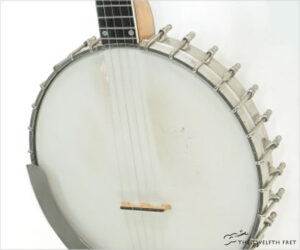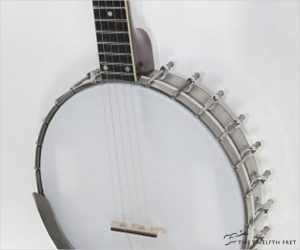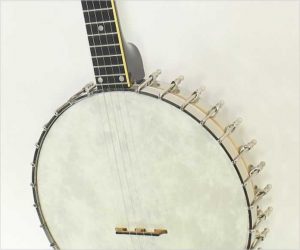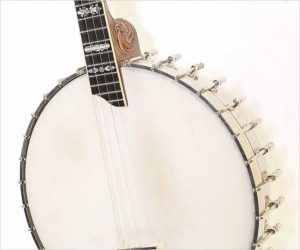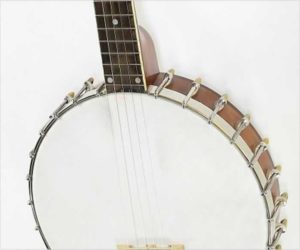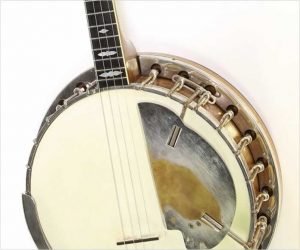Following its original form as an A.C Fairbanks product, the Fairbanks Vega Whyte Laydie featured a natural finish on the maple neck and pot which provided its name. However, the real innovation was the Whyte Ladyie tone ring and bracket band, reducing the number of holes drilled and adding mass to the pot.
Massachusetts
This Vega Pete Seeger banjo was purchased by American composer Earl Robinson in 1966 while he was writing his ‘Concerto for Five String Banjo’. This was first performed by the Boston Pops orchestra under Arthur Fiedler. From the late 1930’s into the 1960’s, Earl Robinson composed a number of well known, largely topical pieces including ‘Joe Hill’ ‘Ballad for Americans’, ‘Black and White’ and ‘Lonesome Train’, performed by many top artists.
This is a Vega Professional Tubaphone openback banjo, with a neck from the 1960s and the pot from a 1923 Vega Tubaphone banjo, a conversion common in the 1960s. Vega, now owned by Deering Banjos, is one of the oldest American banjo brands, founded in 1881 in Boston, Massachusetts. This lovely old banjo is a mix of two Vega banjos: a product of 1960s Hootenanny era.
This instrument has sold
MORE →Here, we’re looking at a Vega Style X Number 9 Tenor Banjo, built in Boston during 1926. Typical of higher end banjos of the era, it is adorned with engraved Mother of Pearl Inlays which are in lovely condition, and the engravings have been re-filled. The banjo features a tube-a-phone tone ring and Maple is used for the neck and dowel. The heel is hand carved, also typical of the era. The backstrap, the wood covering the back of the head, plus the head plate, are Rosewood.
This instrument has sold
MORE →For many years, the Vega company was a prominent musical instrument builder, and the Vega Senator 5-string open back banjo was a typical offering. Market and management changes led to Vega’s decline, and the name has now become a valued Deering brand, recalling the historic banjos of the early part of the 20th century.
This instrument has sold
MORE →It’s always interesting to see vintage pieces like this Bacon and Day Super Tenor banjo, built around 1927 at the Bacon Banjos shop in Boston, Massachusetts. The Super Tenor was built from 1920 to 1927. From 1906 to 1920, noted musician Fredrick Bacon sold banjos under his own name. In 1921, he partnered with David Day and while the company name remained Bacon, many instruments were branded Bacon and Day. Bacon, and Bacon and Day, operated independently until 1940 when they were purchased by Gretsch; the line was discontinued in 1967.
This instrument has sold
MORE →